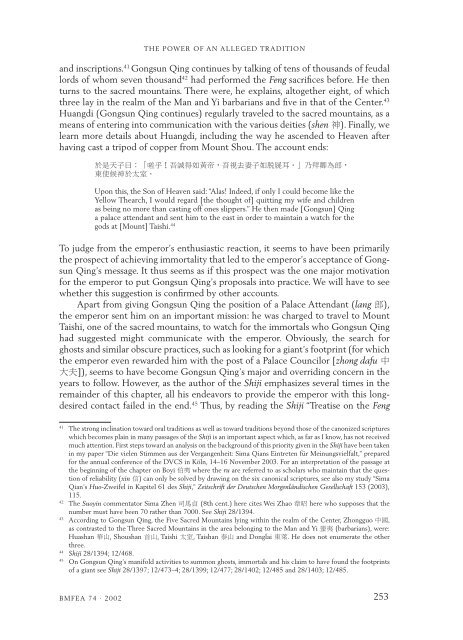The Power of an Alleged Tradition - CHINA Buchservice
The Power of an Alleged Tradition - CHINA Buchservice
The Power of an Alleged Tradition - CHINA Buchservice
Create successful ePaper yourself
Turn your PDF publications into a flip-book with our unique Google optimized e-Paper software.
<strong>an</strong>d inscriptions. 41 Gongsun Qing continues by talking <strong>of</strong> tens <strong>of</strong> thous<strong>an</strong>ds <strong>of</strong> feudal<br />
lords <strong>of</strong> whom seven thous<strong>an</strong>d 42 had performed the Feng sacrifi ces before. He then<br />
turns to the sacred mountains. <strong>The</strong>re were, he explains, altogether eight, <strong>of</strong> which<br />
three lay in the realm <strong>of</strong> the M<strong>an</strong> <strong>an</strong>d Yi barbari<strong>an</strong>s <strong>an</strong>d fi ve in that <strong>of</strong> the Center. 43<br />
Hu<strong>an</strong>gdi (Gongsun Qing continues) regularly traveled to the sacred mountains, as a<br />
me<strong>an</strong>s <strong>of</strong> entering into communication with the various deities (shen��). Finally, we<br />
learn more details about Hu<strong>an</strong>gdi, including the way he ascended to Heaven after<br />
having cast a tripod <strong>of</strong> copper from Mount Shou. <strong>The</strong> account ends:<br />
����������������������������������<br />
��������<br />
Upon this, the Son <strong>of</strong> Heaven said: “Alas! Indeed, if only I could become like the<br />
Yellow <strong>The</strong>arch, I would regard [the thought <strong>of</strong>] quitting my wife <strong>an</strong>d children<br />
as being no more th<strong>an</strong> casting <strong>of</strong>f ones slippers.” He then made [Gongsun] Qing<br />
a palace attend<strong>an</strong>t <strong>an</strong>d sent him to the east in order to maintain a watch for the<br />
gods at [Mount] Taishi. 44<br />
To judge from the emperor’s enthusiastic reaction, it seems to have been primarily<br />
the prospect <strong>of</strong> achieving immortality that led to the emperor’s accept<strong>an</strong>ce <strong>of</strong> Gongsun<br />
Qing’s message. It thus seems as if this prospect was the one major motivation<br />
for the emperor to put Gongsun Qing’s proposals into practice. We will have to see<br />
whether this suggestion is confi rmed by other accounts.<br />
Apart from giving Gongsun Qing the position <strong>of</strong> a Palace Attend<strong>an</strong>t (l<strong>an</strong>g��),<br />
the emperor sent him on <strong>an</strong> import<strong>an</strong>t mission: he was charged to travel to Mount<br />
Taishi, one <strong>of</strong> the sacred mountains, to watch for the immortals who Gongsun Qing<br />
had suggested might communicate with the emperor. Obviously, the search for<br />
ghosts <strong>an</strong>d similar obscure practices, such as looking for a gi<strong>an</strong>t’s footprint (for which<br />
the emperor even rewarded him with the post <strong>of</strong> a Palace Councilor [zhong dafu��<br />
��]), seems to have become Gongsun Qing’s major <strong>an</strong>d overriding concern in the<br />
years to follow. However, as the author <strong>of</strong> the Shiji emphasizes several times in the<br />
remainder <strong>of</strong> this chapter, all his endeavors to provide the emperor with this longdesired<br />
contact failed in the end. 45 Thus, by reading the Shiji “Treatise on the Feng<br />
41 <strong>The</strong> strong inclination toward oral traditions as well as toward traditions beyond those <strong>of</strong> the c<strong>an</strong>onized scriptures<br />
which becomes plain in m<strong>an</strong>y passages <strong>of</strong> the Shiji is <strong>an</strong> import<strong>an</strong>t aspect which, as far as I know, has not received<br />
much attention. First steps toward <strong>an</strong> <strong>an</strong>alysis on the background <strong>of</strong> this priority given in the Shiji have been taken<br />
in my paper “Die vielen Stimmen aus der Verg<strong>an</strong>genheit: Sima Qi<strong>an</strong>s Eintreten für Meinungsvielfalt,” prepared<br />
for the <strong>an</strong>nual conference <strong>of</strong> the DVCS in Köln, 14–16 November 2003. For <strong>an</strong> interpretation <strong>of</strong> the passage at<br />
the beginning <strong>of</strong> the chapter on Boyi �� where the ru are referred to as scholars who maintain that the question<br />
<strong>of</strong> reliability (xin��) c<strong>an</strong> only be solved by drawing on the six c<strong>an</strong>onical scriptures, see also my study “Sima<br />
Qi<strong>an</strong>’s Huo-Zweifel in Kapitel 61 des Shiji,” Zeitschrift der Deutschen Morgenländischen Gesellschaft 153 (2003),<br />
115.<br />
42 <strong>The</strong> Suoyin commentator Sima Zhen ����(8th cent.) here cites Wei Zhao �� here who supposes that the<br />
number must have been 70 rather th<strong>an</strong> 7000. See Shiji 28/1394.<br />
43 According to Gongsun Qing, the Five Sacred Mountains lying within the realm <strong>of</strong> the Center, Zhongguo ����<br />
as contrasted to the Three Sacred Mountains in the area belonging to the M<strong>an</strong> <strong>an</strong>d Yi �� (barbari<strong>an</strong>s), were:<br />
Huash<strong>an</strong> ��, Shoush<strong>an</strong> ��, Taishi ��, Taish<strong>an</strong> �� <strong>an</strong>d Donglai ��. He does not enumerate the other<br />
three.<br />
44 Shiji 28/1394; 12/468.<br />
45 On Gongsun Qing’s m<strong>an</strong>ifold activities to summon ghosts, immortals <strong>an</strong>d his claim to have found the footprints<br />
<strong>of</strong> a gi<strong>an</strong>t see Shiji 28/1397; 12/473–4; 28/1399; 12/477; 28/1402; 12/485 <strong>an</strong>d 28/1403; 12/485.<br />
BMFEA 74 · 2002<br />
THE POWER OF AN ALLEGED TRADITION<br />
253


